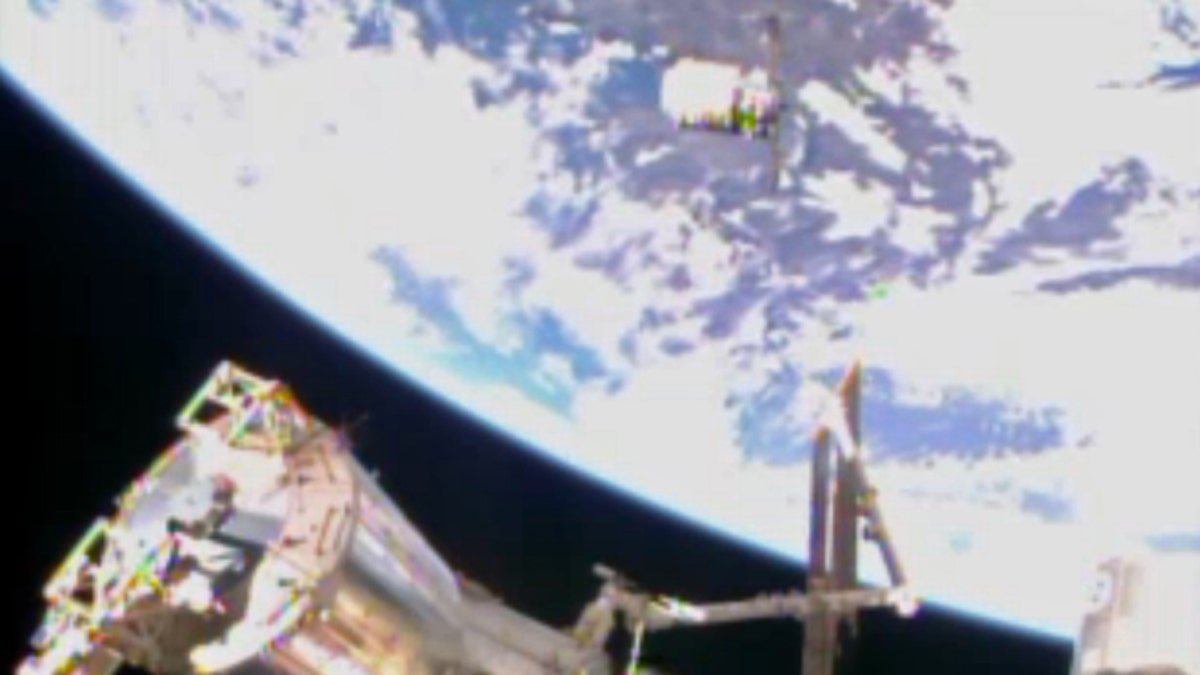
Jan. 12, 2014: In this image from video provided by NASA the Cygnus resupply spacecraft approaches the International Space Station. (AP/NASA)
CAPE CANAVERAL, Fla. – Christmas has finally arrived for the six space station astronauts.
A privately launched supply ship reached the International Space Station on Sunday morning, three days after blasting off from Virginia. The space station crew used a hefty robot arm to capture the Cygnus capsule as the two craft zoomed side by side at 17,500 mph.
The Cygnus is carrying 3,000 pounds of equipment and experiments for NASA, including ants for an educational project. Also on board: eagerly awaited Christmas presents from the families of all six spacemen as well as some fresh fruit courtesy of NASA.
NASA is relying on private industry to keep the orbiting lab well stocked in this post-shuttle era and, in four more years, possibly supply rides for U.S. astronauts as well.
Orbital Sciences Corp. was supposed to make the delivery last month, well before Christmas, but the Virginia company had to wait. A space station breakdown in mid-December took priority, and NASA bumped the flight to January in order to repair the disabled cooling system at the orbiting outpost. Then, frigid weather at the launch site forced a delay. Then a strong solar storm interfered.
Flight controllers for Orbital Sciences, wearing mostly red company shirts, broke into applause once robot arm operator Michael Hopkins grabbed onto the Cygnus, more than 260 miles above the Indian Ocean, northeast of Madagascar. Within two hours, the capsule was bolted to the space station.
Because of the long day, the astronauts were supposed to wait until Monday before opening the hatch to Cygnus. But with presents from their families awaiting them, there was no telling whether they would oblige.
As a holiday treat, NASA stashed away the fruit for the two Americans, three Russians and one Japanese, and Orbital Sciences included a few surprises of its own.
This is the second visit by an Orbital Sciences cargo ship. The first was a test run last September; this one is the first official supply run under a $1.9 billion contract with NASA.
"I've been up here on station for about 3 1/2 months," Hopkins said, "and I've seen two Orbital vehicles in that time, and I think that's very impressive. So congratulations to everyone."
The Cygnus will be filled with trash and cut loose for a fiery, destructive re-entry in mid-February.
NASA is paying Orbital Sciences and the California-based SpaceX company to supply the space station. SpaceX will make its fourth delivery next month, launching from Cape Canaveral. Russia, Japan and Europe also make periodic deliveries.
Russia is the lone means of astronaut transport, however, until SpaceX or another American company is able to fly humans. NASA estimates that should occur by 2017.
This Cygnus is named for the late shuttle astronaut C. Gordon Fullerton, who helped conduct air-launched rockets for Orbital Sciences in the 1990s. He died in August at age 76 following a stroke. Sunday's successful linkup is a testament to Fullerton's career, both Hopkins and Mission Control noted.
"Gordo was an American hero," Mission Control said.
